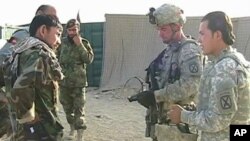At a NATO airbase in Kandahar, southern Afghanistan, U.S. and Afghan aviators prepare for a training mission.
Eight years into the Afghan war, Afghan troops and their U.S. advisers have settled into a sometimes tense relationship.
The Americans try to advise the Afghans in Western methods of warfare. But the Afghans often have their own way of doing things. And that sometimes conflicts with U.S.-led efforts to forge a larger, more independent Afghan security force.
"The biggest lesson really is being conservative and thinking outside the training they had. They all have been trained in the Russian style - this is way you've done this, so it's the way you always will do it," said Captain Tyler Rennell with the 438th Air Expeditionary Training Group.
But an independent Afghan military must be capable of adapting to an elusive enemy. U.S. Army officers say a language barrier impedes American efforts to impart this vital lesson.
Lieutenant Colonel Percy Dunigan oversees Afghan pilot training at Kandahar.
"There's a lot of technical terms in aviation and getting those translated properly and getting transmitted to them in a timely manner, especially when in flight, is a huge challenge. I try to learn a little of their language to take away some of that stress and confusion," he said. "But when you're trying to deal with technical terms and processes on the aircraft, there's no substitute for speaking the same language."
In Logar province, a U.S. Army battalion is paired with an Afghan battalion. The Americans mostly handle the complex missions. Afghan troops usually get simpler assignments, such as staffing road checkpoints.
Staff Sgt. Donald Coleman visits an Afghan position to make sure the troops are doing their jobs. The Afghans complain of equipment and manpower shortages.
"It always goes well when we're here," said Staff Sergeant Coleman. "It's when we leave … I kind of understand. Their complaints or issues or concerns are definitely warranted. Nothing in Afghanistan happens in a day or as quick as it would in the U.S."
A few miles away, more problems as American military police try to show the Afghans how to conduct vehicle searches on short notice.
Seeming not to understand, the Afghans wave cars past the checkpoint without searching any of them. U.S. Army 2nd Lieutenant Gregory Avant abandons the first checkpoint and, after additional instruction, tells the police to start over fresh at another position.
"They're doing better here than at the last," he explained. "They're starting to understand what the intent of the checkpoint is all about."
News
Training Afghan Forces Poses Challenges for US Military
update

Training a competent, well-equipped Afghan security force is key to the U.S.-led war effort in Afghanistan, even with President Obama's decision to commit thousands of more Americans to the fighting. But U.S. military officers in Afghanistan say language and cultural and resource gaps make that difficult to achieve.



